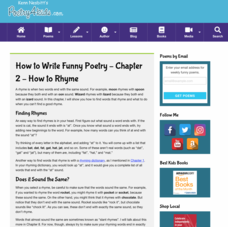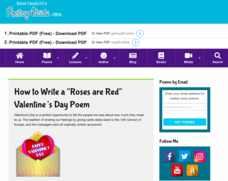Poetry4kids
How to Write Funny Poetry — Chapter 1: Writing Poetry
Do you wish you could write poetry that makes people laugh? Now you can! Check out the first chapter in a poetry writing series that emphasizes the importance of connecting subject matter to a light, bouncy meter.
Poetry4kids
How to Write Funny Poetry — Chapter 2: How to Rhyme
Funny poems don't have to rhyme—but it helps! Learn how to use rhyming words to add humor to funny, clever, or just plain silly poems.
Poetry4kids
How to Write a Limerick
Add a little fun and fancy to English language arts with an activity that challenges scholars to write a limerick. Authors follow five rules in order to compose an original poem that contains a specific rhyme scheme.
Poetry4kids
How to Write a “Favorite Things” List Poem
If your students made a list of their favorite things, would writing poetry be on it? After this poetry writing lesson, it might! Young writers make a list of what they like—or what they don't like—before crafting the list into a rhyming...
Poetry4kids
Rhythm in Poetry: I Am the Iamb
It's fun to write a poem with iambs! Practice using iambs in all types of different poems with an online poetry lesson.
Curated OER
Technopoet - Poetry Lesson Plans
Practice word processing while writing different types of poems. First, elementary and middle schoolers use Word templates to write poetry. They use rhyming and descriptive words as they work with clipart, text wrapping, and picture...
Hong Kong Special Administrative Region
Learning English through Poems and Songs
Exposing learners to the power of words in poetry is a stimulating way to learn languages. Songs, haikus, rhyming words, and narrative works are all employed in a resource for teaching English as a Second Language.
Winterhill School
Poetry Analysis
Gain greater insight into poems using a poetry analysis worksheet. Here, scholars follow steps and answer questions to dissect any poem. Topics include the poem's meaning, theme, technique, and structure, as well as personal thoughts and...
Poetry4kids
How to Write a Clerihew
Writing funny poems is the best part about learning poetic forms! Young poets learn all about clerihews—humorous four-line poems about people—with an explanatory lesson.
Poetry4kids
How to Write a Tanka Poem
Take your haikus to the next level with tanka poems, another form of Japanese poetry that regulates the length and rhythm of each line by syllables. Young writers read the explanation, examples, and tips for tanka poems before writing...
Poetry4kids
Playing With Your Food Poem Lesson
What's more fun than playing with your food? Writing a poem about it! A quick and straightforward lesson guides young writers through the steps of writing a funny, well-structured poem about combining sports and food.
Poetry4kids
How to Write a Fractured Nursery Rhyme
Scholars take a popular song or nursery rhyme and make it their own as they write a fractured nursery rhyme. Writers seek out a nursery rhyme's rhyming words and change them to create an original poem.
Poetry4kids
How to Write a “Roses are Red” Valentine’s Day Poem
Compose a Valentine's Day poem! Practicing their rhyming skills, scholars follow the traditional format to create a happy poem for a friend or family member.
Super Teacher Worksheets
Writing Couplets
Sometimes, getting started is the hardest part; but that is not the case with this poetry worksheet that asks scholars to read through a list of rhyming pars, choose three, and use them to write a couplet poem.
Poetry4kids
How to Write a “Backward” Poem
If you like poetry, wait till you try backward poetry! Young writers read Shel Silverstein's "Backward Bill" before writing their own funny poems that are full of backward imagery and phrasing.
Poetry4kids
How to Write a Funny Epitaph Poem
What can happen if you eat too much cafeteria food? Or wear dirty clothes every day? Or talk back to your mother? Use a lesson on humorous poems as a way for students to practice silly rhymes as fictional epitaphs.
Teacher's Corner
Acrostic
Do your students suffer from metrophobia? Assuage their fears by asking them to craft an acrostic, a form poem that begins with a single word. The first in a series of ten poetry writing exercises.
Curated OER
Lesson: That Long Jakes
Cross-media analysis takes time and attention to detail. The class analyzes the painting Long Jakes and the poem "Backward Bill." They pay attention to the similarities and differences in each piece, looking for details that describe the...
Poetry4kids
Rhythm in Poetry: The Basics
What makes a great poem sound so good? Learn the rhythmic secrets of poetry with an explanatory online lesson.
Poetry4kids
How to Write an Alliteration Poem
Learners follow five steps to compose an alliteration poem. They choose one consonant and brainstorm as many nouns, verbs, and adjectives they can think of to create rhyming sentences that come together in a poetic fashion.
Curated OER
Nurture Poetry
Students create a poetry book. In this poetry lesson, students write a cinquain poem, name poem, haiku, limerick, and preposition poem.
Poetry4kids
Rhythm in Poetry: Okie Dokie, Here’s the Trochee
Iambs and trochees may seem intimidating to some learners, but after reading a straightforward online lesson, they'll be masters of poetic feet! The lesson includes examples of trochaic poems from Edgar Allen Poe and William Blake.
Curated OER
Poetry Workshop: Putting Feelings into Words
Poetry is a wonderful way for learners to express themselves and develop writing skills. A comprehensive PowerPoint presentation defines, and provides examples of, the types and components of poetry. The presentation concludes with a...
Poetry4kids
Rhythm in Poetry: More Than Two Feet
Want to put some feet in your head? Check out an online lesson about spondees, dactyls, and anapests to bring new structure to your poetic forms.

























